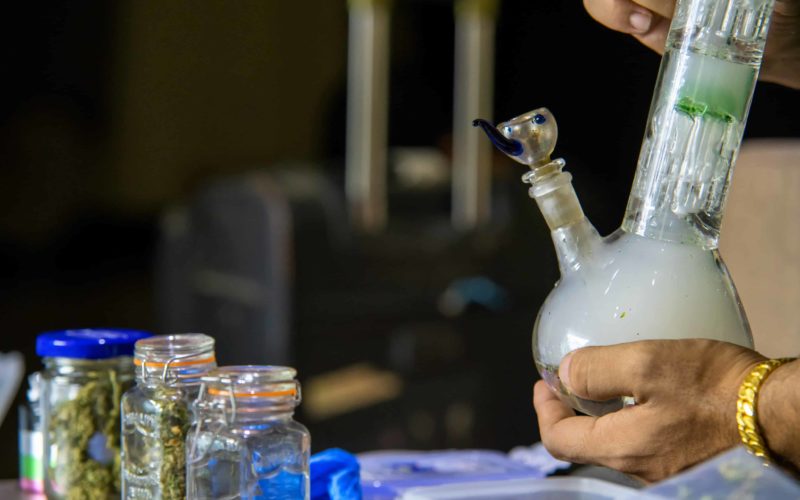Business
Las Vegas City Council Approves Cannabis Consumption Lounges

Council voted 5-1 in favor of the proposal.
The Las Vegas strip is about to get even more lit.
Members of the city council cleared the way for the opening of cannabis consumption lounges, voting 5-1 on Wednesday against a motion that would have had Las Vegas opt out of allowing those businesses, according to the Las Vegas Review-Journal.
The vote came after the Nevada Cannabis Compliance Board in June gave its final sign off on the establishments.
The board laid out procedures for would-be lounge owners at the time.
“In addition to outlining the licensing and operation of consumption lounges, regulations approved today lay the groundwork for greater inclusion within Nevada’s cannabis industry,” the board said in a June release. “All applicants must submit a diversity plan, summarizing actionable steps and goals for meaningful inclusion. Additionally, half of the independent consumption lounge licenses in the initial round must be awarded to social equity applicants.”
“Prior to an open licensing period, the [Cannabis Compliance Board] plans to roll out tools and resources including worksheets, video tutorials and live webinars in order to ensure interested parties have access to the same information and are able to successfully submit an application,” the release continued. “The CCB expects to open the first licensing round for consumption lounges in the Fall, allowing for the first consumption lounges to open as early as the end of the year.”
That final regulatory approval came nearly a year after Nevada state lawmakers approved funding for the Cannabis Compliance Board, which has been charged with overseeing the consumption lounges in the state.
Cities in Nevada could opt out of allowing the consumption lounges in their jurisdictions. According to the Review-Journal, by “not responding to a letter from the Nevada Cannabis Compliance Board earlier this month, the city automatically opted in to the licensing process, but still had an opportunity Wednesday to change course.”
Councilwoman Victoria Seaman filed the motion to opt out, but it was voted down 5-1 on Monday.
Seaman said constituents had told her that “they would rather not have them in the residential areas and have them more in the tourist areas, so, I’m not going to be supporting this,” as quoted by the Review-Journal.
But others view the lounges as yet another boon for Las Vegas’ vibrant tourism industry. It will also provide refuge for the thousands of out-of-towners who descend upon the city each week. As local news station KSNV put it, the state’s “current law leaves many from out of town consuming the drug illegally, either on the streets or a hotel room,” but the cannabis lounges will change that.
According to the Review-Journal, the lounges “will allow marijuana customers to smoke the drug legally for the first time outside of private homes since voters legalized recreational use in 2016.”
“I think it’s important for the city to consider the business opportunity that consumption lounges will bring, and also some relief of issues we’re currently hearing about a lot because we’re not offering a place for folks to actually consume when they buy,” Councilwoman Olivia Diaz told the Review-Journal after the vote on Wednesday. “We have still some way to go and some more work to do.”
The newspaper reported that there will be 20 licenses awarded throughout the state for cannabis consumption lounges, half of which will be given to social equity applicants, individuals from communities that have been disproportionately affected by the War on Drugs.
The Cannabis Compliance Board announced earlier this month that the application period for prospective cannabis consumption lounge owners will open on October 14 and conclude on October 22.
Source: https://hightimes.com/news/las-vegas-city-council-approves-cannabis-consumption-lounges/
Business
New Mexico cannabis operator fined, loses license for alleged BioTrack fraud

New Mexico regulators fined a cannabis operator nearly $300,000 and revoked its license after the company allegedly created fake reports in the state’s traceability software.
The New Mexico Cannabis Control Division (CCD) accused marijuana manufacturer and retailer Golden Roots of 11 violations, according to Albuquerque Business First.
Golden Roots operates the The Cannabis Revolution Dispensary.
The majority of the violations are related to the Albuquerque company’s improper use of BioTrack, which has been New Mexico’s track-and-trace vendor since 2015.
The CCD alleges Golden Roots reported marijuana production only two months after it had received its vertically integrated license, according to Albuquerque Business First.
Because cannabis takes longer than two months to be cultivated, the CCD was suspicious of the report.
After inspecting the company’s premises, the CCD alleged Golden Roots reported cultivation, transportation and sales in BioTrack but wasn’t able to provide officers who inspected the site evidence that the operator was cultivating cannabis.
In April, the CCD revoked Golden Roots’ license and issued a $10,000 fine, according to the news outlet.
The company requested a hearing, which the regulator scheduled for Sept. 1.
At the hearing, the CCD testified that the company’s dried-cannabis weights in BioTrack were suspicious because they didn’t seem to accurately reflect how much weight marijuana loses as it dries.
Company employees also poorly accounted for why they were making adjustments in the system of up to 24 pounds of cannabis, making comments such as “bad” or “mistake” in the software, Albuquerque Business First reported.
Golden Roots was fined $298,972.05 – the amount regulators allege the company made selling products that weren’t properly accounted for in BioTrack.
The CCD has been cracking down on cannabis operators accused of selling products procured from out-of-state or not grown legally:
- Regulators alleged in August that Albuquerque dispensary Sawmill Sweet Leaf sold out-of-state products and didn’t have a license for extraction.
- Paradise Exotics Distro lost its license in July after regulators alleged the company sold products made in California.
Golden Roots was the first alleged rulebreaker in New Mexico to be asked to pay a large fine.
Source: https://mjbizdaily.com/new-mexico-cannabis-operator-fined-loses-license-for-alleged-biotrack-fraud/
Business
Marijuana companies suing US attorney general in federal prohibition challenge

Four marijuana companies, including a multistate operator, have filed a lawsuit against U.S. Attorney General Merrick Garland in which they allege the federal MJ prohibition under the Controlled Substances Act is no longer constitutional.
According to the complaint, filed Thursday in U.S. District Court in Massachusetts, retailer Canna Provisions, Treevit delivery service CEO Gyasi Sellers, cultivator Wiseacre Farm and MSO Verano Holdings Corp. are all harmed by “the federal government’s unconstitutional ban on cultivating, manufacturing, distributing, or possessing intrastate marijuana.”
Verano is headquartered in Chicago but has operations in Massachusetts; the other three operators are based in Massachusetts.
The lawsuit seeks a ruling that the “Controlled Substances Act is unconstitutional as applied to the intrastate cultivation, manufacture, possession, and distribution of marijuana pursuant to state law.”
The companies want the case to go before the U.S. Supreme Court.
They hired prominent law firm Boies Schiller Flexner to represent them.
The New York-based firm’s principal is David Boies, whose former clients include Microsoft, former presidential candidate Al Gore and Elizabeth Holmes’ disgraced startup Theranos.
Similar challenges to the federal Controlled Substances Act (CSA) have failed.
One such challenge led to a landmark Supreme Court decision in 2005.
In Gonzalez vs. Raich, the highest court in the United States ruled in a 6-3 decision that the commerce clause of the U.S. Constitution gave Congress the power to outlaw marijuana federally, even though state laws allow the cultivation and sale of cannabis.
In the 18 years since that ruling, 23 states and the District of Columbia have legalized adult-use marijuana and the federal government has allowed a multibillion-dollar cannabis industry to thrive.
Since both Congress and the U.S. Department of Justice, currently headed by Garland, have declined to intervene in state-licensed marijuana markets, the key facts that led to the Supreme Court’s 2005 ruling “no longer apply,” Boies said in a statement Thursday.
“The Supreme Court has since made clear that the federal government lacks the authority to regulate purely intrastate commerce,” Boies said.
“Moreover, the facts on which those precedents are based are no longer true.”
Verano President Darren Weiss said in a statement the company is “prepared to bring this case all the way to the Supreme Court in order to align federal law with how Congress has acted for years.”
While the Biden administration’s push to reschedule marijuana would help solve marijuana operators’ federal tax woes, neither rescheduling nor modest Congressional reforms such as the SAFER Banking Act “solve the fundamental issue,” Weiss added.
“The application of the CSA to lawful state-run cannabis business is an unconstitutional overreach on state sovereignty that has led to decades of harm, failed businesses, lost jobs, and unsafe working conditions.”
Business
Alabama to make another attempt Dec. 1 to award medical cannabis licenses

Alabama regulators are targeting Dec. 1 to award the first batch of medical cannabis business licenses after the agency’s first two attempts were scrapped because of scoring errors and litigation.
The first licenses will be awarded to individual cultivators, delivery providers, processors, dispensaries and state testing labs, according to the Alabama Medical Cannabis Commission (AMCC).
Then, on Dec. 12, the AMCC will award licenses for vertically integrated operations, a designation set primarily for multistate operators.
Licenses are expected to be handed out 28 days after they have been awarded, so MMJ production could begin in early January, according to the Alabama Daily News.
That means MMJ products could be available for patients around early March, an AMCC spokesperson told the media outlet.
Regulators initially awarded 21 business licenses in June, only to void them after applicants alleged inconsistencies with how the applications were scored.
Then, in August, the state awarded 24 different licenses – 19 went to June recipients – only to reverse themselves again and scratch those licenses after spurned applicants filed lawsuits.
A state judge dismissed a lawsuit filed by Chicago-based MSO Verano Holdings Corp., but another lawsuit is pending.
Source: https://mjbizdaily.com/alabama-plans-to-award-medical-cannabis-licenses-dec-1/
-

 Business2 years ago
Business2 years agoPot Odor Does Not Justify Probable Cause for Vehicle Searches, Minnesota Court Affirms
-

 Business2 years ago
Business2 years agoNew Mexico cannabis operator fined, loses license for alleged BioTrack fraud
-

 Business2 years ago
Business2 years agoAlabama to make another attempt Dec. 1 to award medical cannabis licenses
-

 Business2 years ago
Business2 years agoWashington State Pays Out $9.4 Million in Refunds Relating to Drug Convictions
-

 Business2 years ago
Business2 years agoMarijuana companies suing US attorney general in federal prohibition challenge
-

 Business2 years ago
Business2 years agoLegal Marijuana Handed A Nothing Burger From NY State
-

 Business2 years ago
Business2 years agoCan Cannabis Help Seasonal Depression
-

 Blogs2 years ago
Blogs2 years agoCannabis Art Is Flourishing On Etsy













